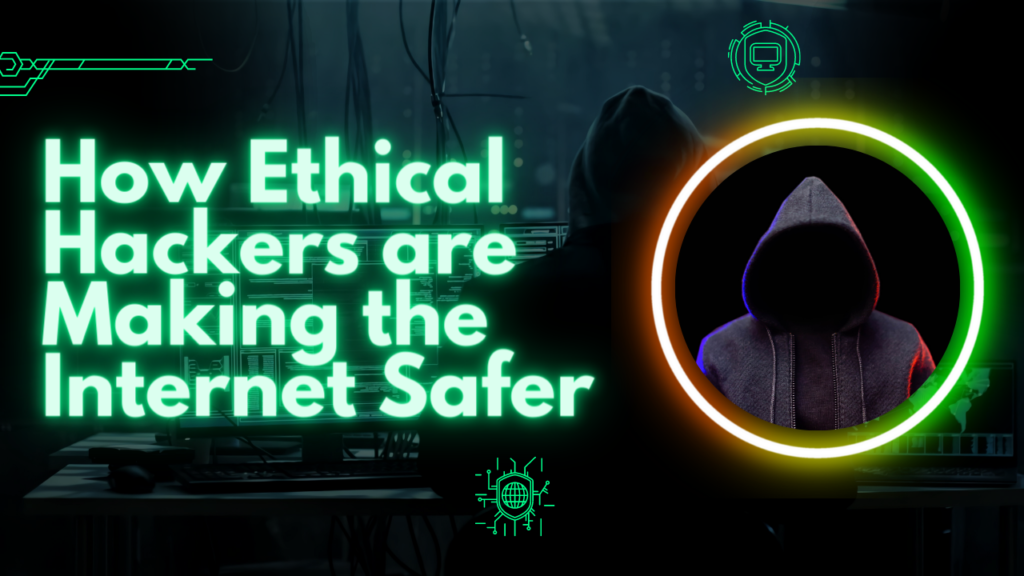In this digital world, the majority of us use the internet daily, whether it’s to watch a new Netflix series, do online shopping, or conduct business operations. But while you may not think twice before visiting a website or sending an email with confidential information from your bank account, that data is more vulnerable than you might realize. Even with heavy security measures in place by networks and companies responsible for protecting these websites and databases for users worldwide, cybercriminals are always thinking of new ways to bypass those protections, making it imperative to have ethical hackers on guard against malicious threats.
In this post, you will learn how ethical hackers are playing a critical role in keeping our digital world safe by providing the right optics into system weaknesses that need reinforcement. Read on to understand better why ethical hacking presents both opportunity AND responsibility in securing our lives online.
What is Ethical Hacking and How Does It Work?
Ethical hacking is a term used to refer to the practice of infiltrating secure computer systems for the purpose of testing and evaluating their vulnerability and ultimately improving or securing their security measures. This type of hacking is conducted under strict guidelines set out by organizations and requires expert information technology personnel in order to achieve success.
Whenever ethical hackers are used, it is typically with the permission of the organization in question, thus minimizing any potential damage done. The process involved in performing this task starts with a risk assessment carried out by a qualified professional to identify any unknown risks that may be present. After that, ethical hackers will use specialized tools and techniques such as port scanning and vulnerability assessments to determine what needs to be secured further. Once they have identified any potential risks, they will take measures such as patching or firewall configuration changes in order to rectify them. Ethical hacking provides a crucial service in today’s digital landscape as it helps ensure organizations remain current on their security protocols and remain safe from malicious actors.
The Benefits of Ethical Hacking for Businesses and Individuals
Ethical hacking offers numerous benefits for businesses and individuals alike. It is a practice used by cyber experts to find vulnerabilities in computer systems and networks before malicious hackers do. This allows organizations to avoid devastating data breaches and other serious security issues, protecting their information as well as the privacy of people who may have sensitive accounts with them. Beyond business applications, ethical hacking can also be used by individuals to secure personal devices and networks at home by testing how easily they can be compromised and the various ways they would need to be protected against threats. Consequently, this invaluable skill set gives people greater peace of mind when it comes to the security of their digital information.

Different Types of Cyber Attacks and the Tools Hackers Use to Stop Them
With advances in technology come potential risks. In particular, cyber security is a constant challenge; hackers are constantly searching for networks and computer systems with vulnerabilities that they can exploit. One of the most common types of cyber attacks is phishing, in which attackers attempt to obtain valuable information such as passwords and financial data by tricking users into sharing it. Malware can also be used to gain unauthorized access to websites or computers; malware is malicious software created with the intention of stealing sensitive data or damaging a system. The use of ransomware involves hackers actually locking users out of their own systems and demanding payment in order to regain access. Fortunately, more and more organizations are beginning to adopt various tools and strategies which help protect against online threats like these. From secure firewalls to improved password containment practices, these methods offer much-needed protection against a sophisticated and determined adversary.
How Companies are Investing in Training Ethical Hackers?
In the age of digital transformation, companies are taking increased measures to protect their data and networks from malicious threats. As a result, they’re investing more money in ethical hacking to stay ahead of the growing cybersecurity risk. Ethical hacking involves training people in the evaluation and prevention of security risks within an organization’s infrastructure. Companies are especially hiring those with experience and qualifications like the CEH (Certified Ethical Hacker) certification. This certification demonstrates that professionals have obtained a standard set of skills that can be evaluated when determining if they would make a suitable ethical hacker. Services offered by these certified professionals range from penetration testing to exploit testing to vulnerability scanning. Companies are recognizing that training and educating ethical hackers is invaluable to protecting their digital assets.
Understanding the Risks of Not Having Proper Security Measures in Place
When running a business, there are numerous risks to consider. One of the most pressing concerns is ensuring proper security measures are in place. Without adequate safety protocols, companies can be left vulnerable to all types of malicious threats including criminals attempting to access sensitive data or hackers attempting to break in and disrupt operations. Worse still, any breach of security could ruin the reputation and image of a company, leading customers to lose trust. Businesses must therefore invest in efficient cyber-security solutions and utilize sophisticated tools that can detect, prevent, and recover from potential intrusion scenarios. Only through understanding the risks associated with lax security measures can businesses ensure they protect their institutional knowledge, customer information, operational continuity, and overall reputation.
The Future of Ethical Hacking and Its Role in Online Security
The future of ethical hacking looks very promising for online security. Through the use of advanced technologies, ethical hacking can provide a powerful tool in both protecting and advancing data security against malicious attacks. Ethical hackers are increasingly seen as an essential element in any comprehensive cybersecurity strategy, helping to detect vulnerabilities and prevent network intrusions before it is too late. As more damage is caused by breaches worldwide, the importance of ethical hackers in shielding information from the ever-evolving specter of cybercrime will only become more evident. Organizations should invest in ethical hackers to build secure networks that are capable of defending their data even against sophisticated threats. By taking proactive steps to boost their online safety now, organizations can protect themselves from potentially disastrous situations down the line.
Final Words
Ethical hacking is an essential part of the world’s cyber security infrastructure. It helps organizations identify potential threats and implement defensive measures to limit their exposure and prevent attackers from gaining access to sensitive data. Hackers use a variety of tools, techniques, and knowledge to help protect against cyber attacks, from prevention methods such as encryption to post-attack measures like patching and monitoring. As the internet evolves, companies are investing more heavily in training ethical hackers and making security a priority across their entire organization. Understanding the risks of inadequate security is also paramount in best preparing for an attack. Despite some ethical hacking challenges that still remain today, future research can find solutions to increase online safety as well as various implications for its use. Ethical hacking is becoming increasingly important, not just for businesses but for individuals too, as it helps them stay ahead of changing technologies, and criminal activities online, and monitor their own safety.

